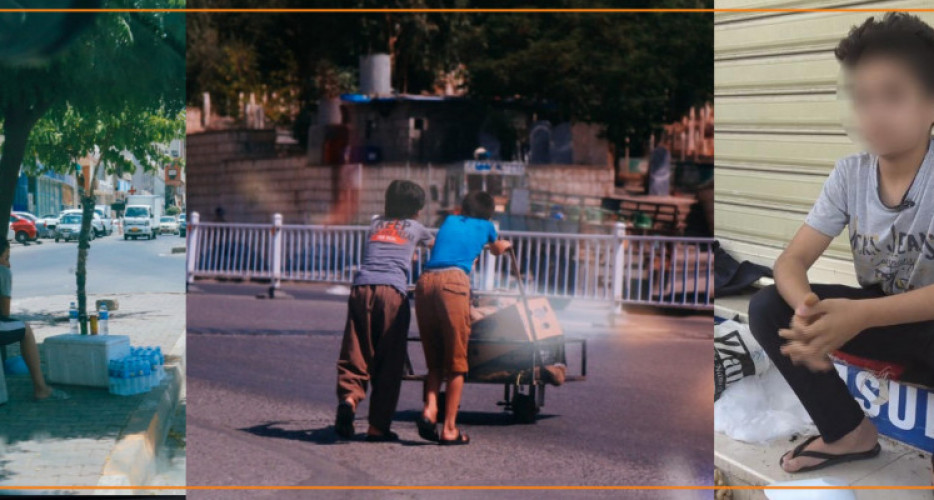
PEREGRAF- Ghamgin Muhammed
"I don't like to work, but we have to work because of my family, and some days my brother sleeps in the Bazar," said Amer, one of the children, who is only 11 years old and sells envelopes along with his six-year-old brother.
The grief of these children is the daily livelihood, when they get enough money, that day is a feast for them.
International Children's Day, or Children's Day, is June 1 every year, but working children in the Mawlawi Street and the other places in Sulaimaniyah are least aware of this day.
Amer lives in a family of 10 displaced people, who are from the Salahaddin Province and have visited the Kurdistan Region. Their situation could be the reason as to why his family doesn’t pay much attention to school and studies and the reason behind him studying only up to the second grade.
Amer’s father goes to the bazar with both of his children every day to work. He is the breadwinner and they come back together in the evening.
Only in Mawlawi Street, 15 children were working; some selling water and some envelopes, some carrying heavy loads for citizens to a main street or till their cars in exchange for some money.
None of these children have reached the age of 15, which is completely against the law and the guidelines of the Kurdistan Region and Iraq.
According to Iraqi Labor Law, children under the age of 15 are allowed to work, provided it is not a hazardous job and does not pose a risk to morals, behavior, education and does not exceed seven hours, and children under 17 years of age should not work at night.
Awat Muhsin, a shopkeeper in Mawlawi Street, said most of the children working in the market are displaced and "their behavior is not like normal children". "They fight among themselves daily and swear at each other, and the shopkeepers are annoyed with them."
According to a follow-up by the Kurdistan Save the Children organization –non-profit, non-governmental organization founded in 1991, 98 percent of children working are children of displaced families in other parts of Kurdistan, central and southern Iraq, 2 percent of them are from the Kurdistan Region.
"What is difficult is to banish displaced children from work, because most of them do not go to school and have no designated housing, so it is not easy for them to participate in specific music courses and drawing courses in order to stop working," said Nawman Abdulrahman, a communications and coordination manager at the Kurdistan Save the Children organization told PEREGRAF.
In the Kurdistan Region, the Ministry of Social Affairs, a party responsible for living and preventing children from working, has a strategic plan to keep children off the streets in two years and provide them with suitable childhood conditions.
Dler Sabir, a legal expert at the Ministry of Social Affairs, told PEREGRAF that the implementation of the stages of the plan requires about $15 million and has not yet been implemented because of the lack of funds.
The ministry does not have its own sources of statistics of working children, but according to different statistics from children's organizations, about 20,000 children work in the Kurdistan Region. Some of them perform challenging and hard jobs, and are increasing at the time where schools are closed and there is a wave of refugees and migrants.
Not only in the bazar, but in most traffic places and the main roads of the Kurdistan region, children work, sell water and tissue paper, or clean car windows for a small amount of money, at a time when, according to the Children's Rights Agreement, every child has the right to not work and to live a secure and safe life.
According to PEREGRAF follow-ups, some children work in groups at traffic lights and congested roads, or have older and relatives or neighbors close to them, who are responsible to supervise them.
There is a committee comprising the mayors of the cities, in charge to monitor and protect children working in different streets and places. If it appears that every child in a family is in good financial conditions and children are sent to work for experience, they will be taken to the Youth Police and contracts with their parents will be filled if they do not work. In case of repeat offenses, the parents will face sanctions, ranging between 100,000 and 500,000 dinars under the care of the juvenile, and the prison sentence shall not be more than one year.
"There are families who have been given contracts five times, but each child has been sent to work on the street and they have sent a case to the juvenile court for questioning, and the judge decides on restitution, not imprisonment," said Bakhtiar Ghafur.
Families from poor living conditions are also provided with community services by providing the elder one in the family with jobs or providing them with the basic necessities of family life, with the aim of preventing their child from working.
Despite the efforts of the Children's Rights organization, observers and child education experts say they have been deprived of their rights in the Kurdistan Region and are facing more and more hardships day after day. But owing to the responsibilities of their families, they are gradually restoring a decent life.